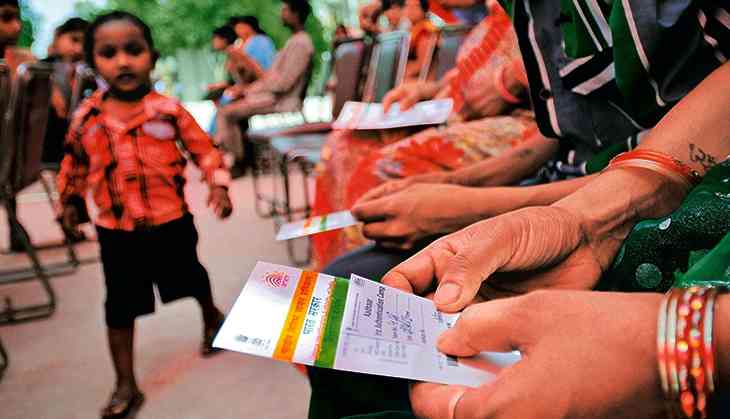Sonia & Rahul Gandhi call SC verdict on privacy a major blow to fascist forces

Welcoming the unanimous Supreme Court judgement declaring right to privacy as a fundamental right, Congress President Sonia Gandhi claimed that the verdict heralds a new era for individual rights, personal liberty and human dignity.
According to Gandhi, the verdict strikes a blow on the unbridled encroachment and surveillance by the State and its agencies in the life of the common man.
“The Congress Party & our governments along with other opposition Parties stood together, in court and in Parliament, to speak out for the right to privacy & dignity of all Indians against the arrogant attempts of the present Govt to curtail them,” said the Congress President in her statement.
Calling the verdict a victory for every Indian and a major blow to fascist forces, Congress vice president Rahul Gandhi took pot shots at the BJP and said that the Right to Privacy verdict is a “sound rejection” of saffron party's ideology of suppression through surveillance.
Moments after the verdict, the Gandhi scion tweeted:
SC decision marks a major blow to fascist forces.A sound rejection of the BJP's ideology of suppression through surveillance#RightToPrivacy
— Office of RG (@OfficeOfRG) August 24, 2017
The core of personal liberty
Meanwhile, praising the Supreme Court, senior Congress leader and former Union Finance Minister P Chidambaram added that freedom was enlarged and enriched from time to time by the wisdom of Parliament and the sagacity of the Supreme Court.
“We salute the Supreme Court and the many counsel - senior and junior - who worked tirelessly, did extensive and splendid research and presented persuasive arguments before the Court. Today, we can once again celebrate our freedom. Tomorrow, there will be other challenges, other questions, and other attempts to invade the right to privacy. We shall overcome those challenges too," he said.
The senior Congress leader went on to add that the most important fundamental right of a citizen is embodied in Article 21 of the Constitution. “It is the right to life and liberty. Civilised societies will breathe meaning into that precious right and guard against any erosion of that right,” said Chidambaram.”
Elaborating further on the judgement, Chidambaram said, “Privacy is at the core of personal liberty. In fact, privacy is an inalienable part of life itself. By virtue of the judgement of the Supreme Court, Article 21 has acquired a new magnificence.”
A setback for the government
Earlier in the day, while hearing a batch of petitions challenging the Centre's move to make Aadhaar mandatory for availing various social welfare scheme benefits, the nine-judge bench, headed by Chief Justice JS Khehar, was unanimous in their decision of calling privacy a fundamental right.
While passing the verdict, the court observed, “The right to privacy is protected as an intrinsic part of the right to life and personal liberty under Article 21 and as a part of the freedoms guaranteed by Part III of the Constitution.”
The court's verdict comes as a major setback to the government which had earlier claimed that the Constitution does not guarantee individual privacy as an absolute fundamental right.
However, the SC did not comment on whether linking of Aadhaar with financial transactions will amount to a breach of privacy. The matter is being heard by another bench of the SC, but experts feel this verdict will certainly have a bearing on that case.
On the question of whether Congress believes that Aadhaar is an infringement on the Right of Privacy, Chidambaram said, “No, the Aadhar that we have conceived was perfectly compatible with the right to privacy. Aadhaar was conceived as an administrative tool in order to ensure that benefits reach the targeted people. It is not Aadhaar that is inconsistent with the right to privacy but the interpretation of this government of Article 21, which is an invasion of right to privacy. It is the current government which argued that there is no fundamental right to privacy.”
The former Union minister maintained that there is considerable merit in the argument that the use of Aadhaar should be limited. He said that Aadhaar was intended to ensure that when government’s benefits are distributed, there is no leakage, no duplication and no falsification.
“But Aadhaar can’t become be all and end of all to administrative issues and therefore, this government’s approach to Aadhaar is totally inconsistent with the UPA government’s approach to Aadhaar,” he added.
Chidambaram claimed that there is nothing wrong in distributing Aadhaar cards or asking citizens to apply for one, but raised issues on how it is being made mandatory for several purposes.
“They say Aadhaar will be necessary even to enrol your child in school. That is why, I think the fault is not in the Aadhaar concept, the fault is in how this government plans to use or misuse Aadhaar as a tool,” he pointed.
First published: 24 August 2017, 16:13 IST
